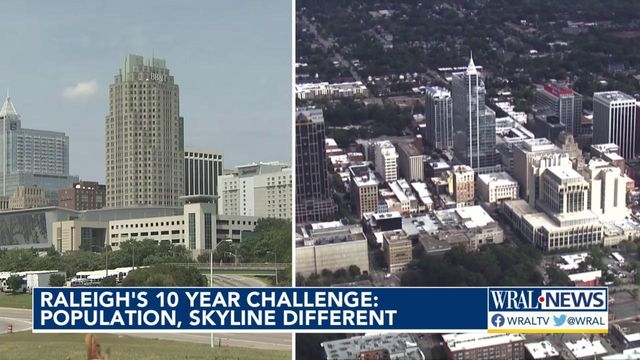10 year challenge Raleigh edition: Changes in population, demographics, skyline
People and places tend to change over time. One look at Raleigh's skyline in 2011 versus now gives you an idea of how much development has taken place here.
Posted — UpdatedPeople and places tend to change over time. One look at Raleigh’s skyline in 2011 versus now gives you an idea of how much development has taken place here.
"I'm a native of Raleigh," said Bob Coats, the North Carolina Census Liaison. "I was born here, so I can tell you that it's a dramatically different city than town than I grew up in."
Coats says there’s no question that Raleigh is growing. In 10 years time, its population jumped about 15 percent, census information shows.
"Migration is driving a lot of the growth," Coats said.
That migration can drive up some other metrics though – like housing prices.
"That migration is coming from an area where, traditionally, housing prices are higher," said Coats.
The city as a whole has seen housing prices go up 98 percent in the last 10 years, according to Zillow data.
Tom Dudeck, another Raleigh native, said he's noticed more and more cars with license plates from states all over. Dudeck's North Hills home doubled in value since he bought it in 2011.
"It's supply and demand," he said. "They're not building homes near here any time soon and, if you wanted to purchase this home, then there's a lot more people here today than they were 10 years ago that wanted to purchase this."
That's worrisome, because housing costs are increasing at a rate much faster than the average city resident’s wages. Without being adjusted for inflation, the median income for a Raleigh resident rose to $69,333 in 2019 from $49,931 a decade ago, according to the Carolina Population Center.
"You look at the rate that home prices increase, and I do worry," said Dudeck. "If you were a younger person, I don't know where and how you're getting your first home."
But both Dudeck and Coats think, when you look around, you can see Raleigh is having a glow up – getting better with each passing year.
"There's a much better food scene, a different music scene, the character," said Coats. "The city has changed a lot, and I think that's all very positive. The face of the city, the languages that you hear when you're around the diversity brings a level of insight."
• Credits
Copyright 2024 by Capitol Broadcasting Company. All rights reserved. This material may not be published, broadcast, rewritten or redistributed.






